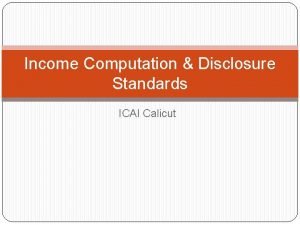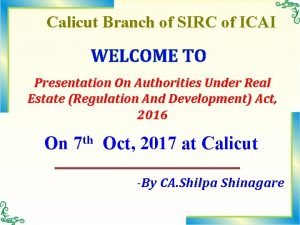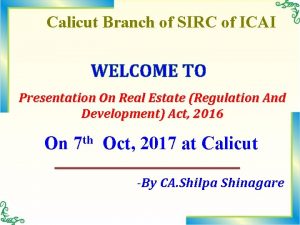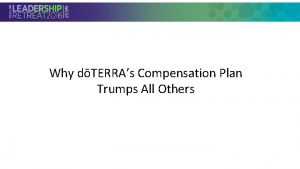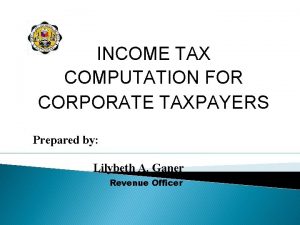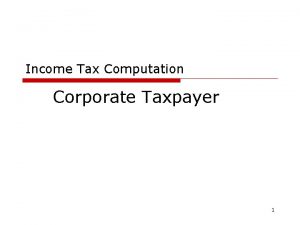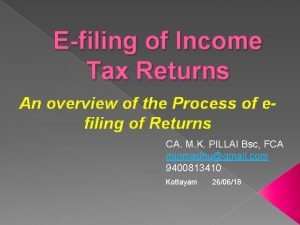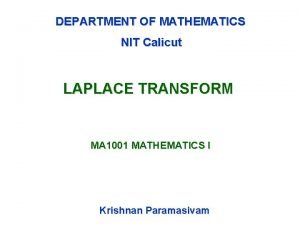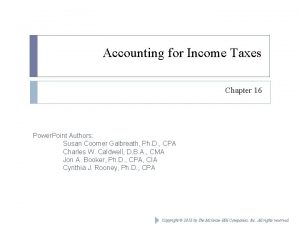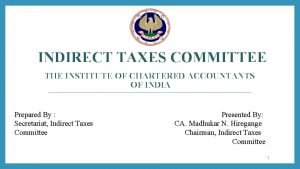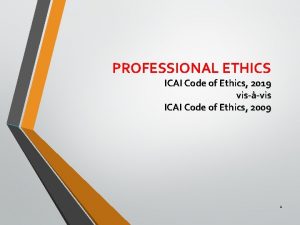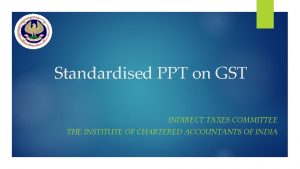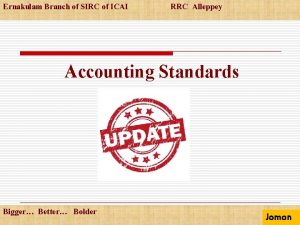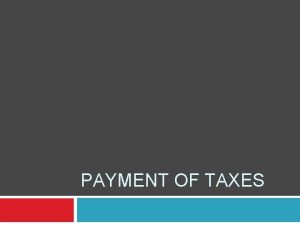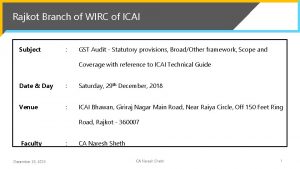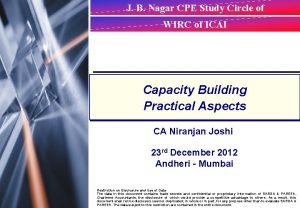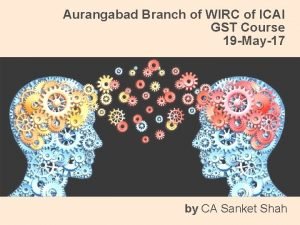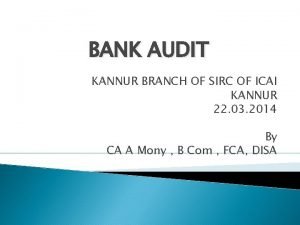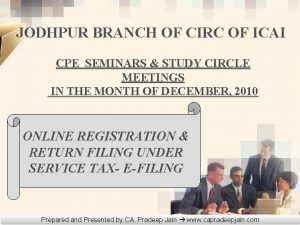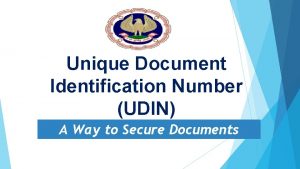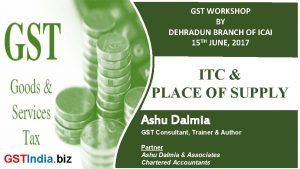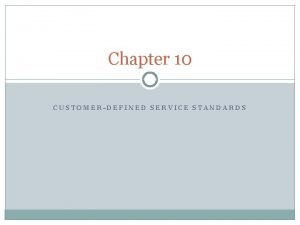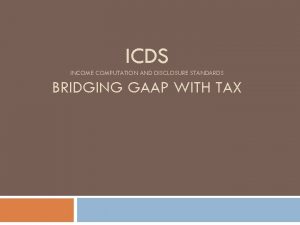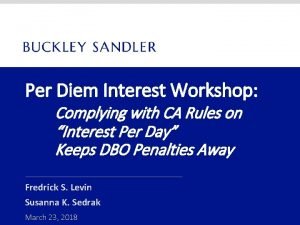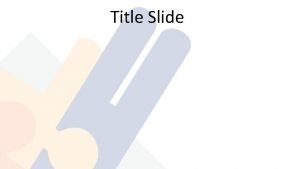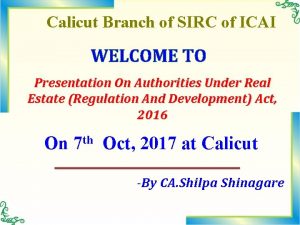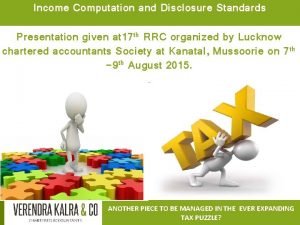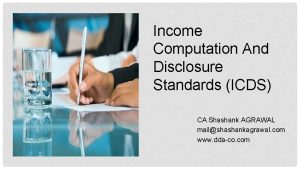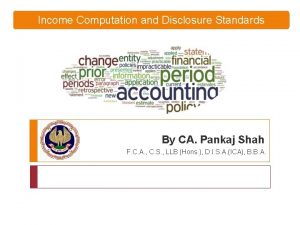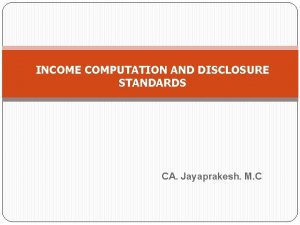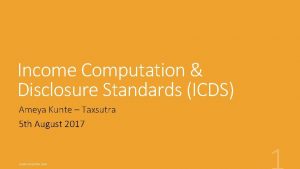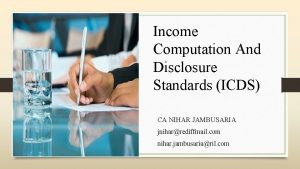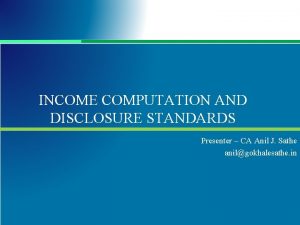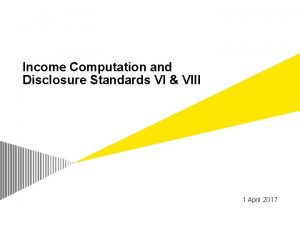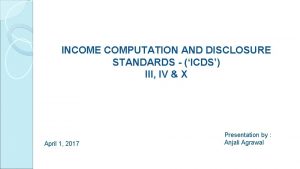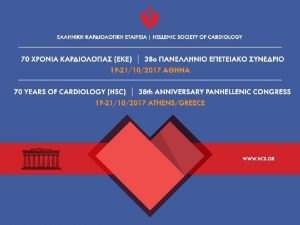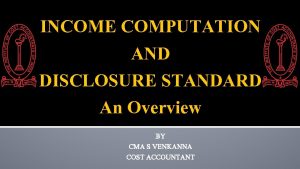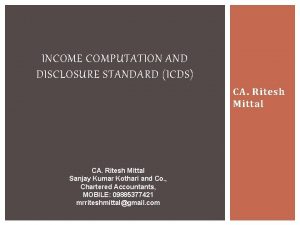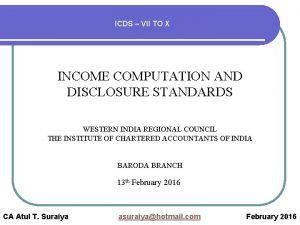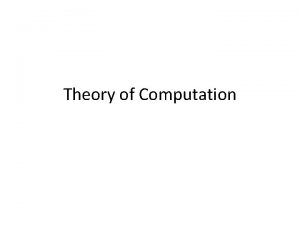Income Computation Disclosure Standards ICAI Calicut Contents Overview































- Slides: 31

Income Computation & Disclosure Standards ICAI Calicut

Contents �Overview of ICDS �Applicability �ICDS vis-à-vis IT Act, Rules, Case Laws �Impact and disclosure �ICDS 1 -10 impact analysis

Overview of ICDS

ICDS Applicability NOTIFICATION - S. O. 3079 (E) dated 29/9/2016 �ICDS applicable from AY 2017 -18 �ICDS to be followed by all assessees following mercantile system of accounting except in case of individuals and HUF not liable for tax audit u/s 44 AB �ICDS applicable in respect of income under heads �Profits & gains from business or profession �Income from other sources �Non compliance results in best judgment assessment u/s 144 �Transitional provisions for treatment of continuing items as on 1. 4. 16

Applicability – case studies Situation ICDS Applicability Individual having turnover of Rs 50 lakhs covered by presumptive taxation u/s 44 AD X Firm having turnover of Rs 20 lakhs covered by presumptive taxation u/s 44 AD* Company/LLP having income from house property of Rs 5 lakhs X Individual having turnover of Rs 30 lakhs and getting accounts audited u/s 44 AB due to net loss Firm having turnover of Rs 10 crores following cash system of accounting X Individual having income from other source of Rs 5 * As per ICAI GN on ICDS, S. 145 would not apply to such entities. CBDT X Circular crore 10/2017 says computation of sales / turnover will be as per ICDS

Applicability – case studies �M/s XYZ having turnover of Rs 10 crore follows mercantile system of accounting for business income and cash system of accounting for income from other sources ICDS would apply only in respect of business income �M/s XYZ having 2 businesses – manufacturing and commission sales. Income recognised on accrual basis for manufacturing business and on cash basis for commission business ICDS would apply only in respect of manufacturing business income

Applicability – case studies � Taxpayer following mercantile system of accounting till FY 2015 -16 switches to cash system in 2016 -17. is it permissible under ICDS? Taxpayer entitled to change method of accounting provided change is bonafide and it is followed regularly thereafter. As per ICAI GN on ICDS, change in method of accounting does not fall under change in accounting policy and hence requirement of “reasonable cause” does not apply � XYZ Ltd, a foreign company receives royalty from an Indian company. Would ICDS apply to XYZ Ltd ICDS applicable to all taxpayers including non residents. Non resident eligible for DTAA benefit may claim such benefit if it is more favourable –for e. g. , in case of royalty income DTAA permits taxation on receipt basis � Applicability to charitable trusts ICDS does not apply to principles of application of income which is based on concept of commercial income

ICDS vis-à-vis Act, Rules, Case laws Conflict between IT Act and ICDS �IT Act would prevail - For e. g. , banks can recognise interest income on NPA as per S. 43 D on realisation basis whereas ICDS requires accrual basis Conflict between IT Rules and ICDS �Specific rule governing situation would prevail - For e. g. , in case of film producers, income would be computed as per Rule 9 A and not as per ICDS Conflict with circulars / notifications �Circulars binding on tax department unless withdrawn – beneficial circulars can be relied upon �Earlier notifications would be overruled by ICDS Conflict with judicial precedents �Judgement relying on AS / established accounting convention would be overruled by ICDS – For e. g. , allowability of provision for expected losses of contractor �Where courts have interpreted the provisions of IT Act, ICDS cannot overrule such decisions – For e. g. , grant in the nature

IT Act Amendments – ICDS alignment � Income definition to include ‘assistance’ in any form from government in cash or kind except subsidy considered for reduction from ‘actual cost’ as per Exp. 10 to s. 43(1) � Not applicable to LPG subsidy � Deletion of ‘for extension of existing business or profession’ as a condition for disallowance of interest for acquisition of asset � Bad debt deduction for income recognised as per ICDS (without recording in books) in the year in

ICDS Impact Business income Income as per IT Act xxx Add: Increase in income as per ICDS xxx Less: Reduction in income as per ICDS xxx Taxable income under business income XXX Income from other sources Income computed as per IT Act xxx Add / Less change in income as per ICDS xxx Taxable income under other sources XXX

ICDS Disclosure �Return forms amended to disclose impact of ICDS on tax computation �Tax auditor to certify adjustments as per ICDS �Step up from earlier role where tax computation was the responsibility of the assessee and role of tax auditor restricted to certifying true and fair view of accounts and disclosure of particulars given in Form 3 CD �Separate column for disclosures as per each ICDS in Form 3 CD �Disclosure cannot remedy wrong / inappropriate treatment of any item

ICDS 1 -10 impact analysis

ICDS – 1 Accounting policies �Relates to accounting policies for computation of taxable income �Going concern, consistency and accrual recognised as fundamental accounting assumptions �Choice of accounting policy – depict true and fair view of state of affairs and income �Use substance over form �Prudence and materiality omitted �MTM losses not permitted to be recognised unless covered by other ICDS �Accounting policy cannot be changed without reasonable cause

ICDS – 1 impact analysis �MTM derivative loss cannot be claimed as a deduction except on settlement except as permitted by other ICDS �MTM gains not considered as income �Expected loss cannot be recognised as an expense except as permitted by other ICDS �Case study: - A Ltd recognises MTM gains and losses in respect 2015 -16 of a 3 year forward Particulars 2016 -17 contract 2017 -18 MTM gain / (loss) Gain Loss Gain Pre ICDS Taxable Deductible Post ICDS NA Non deductible Realised gain less gain of 15 -16

ICDS – 2 Inventories �Inventory valuation at lower of cost / NRV �Methods permitted - Specific Identification, FIFO / Weighted Average �Cost can be measured using standard costing / retail method �Constant review + confirmation regarding approximation to actual cost �Inclusive method including value of taxes and duties for inventory valuation �Mark down to NRV – item by item basis on cost comparison �In case of raw materials mark down if final product expected to be sold below cost �Opening stock = closing stock of previous year

ICDS – 2 impact analysis �Service provider not covered by ICDS – III need to not compute WIP �Service provider reference deleted in ICDS – II �Inventory definition does not include service provider �Stock of partnership firm where business taken over by a partner �Overrules Shakthi Trading (250 ITR 871) �Opening stock = closing stock of previous year �GST transitional credit issue

ICDS – 3 Construction Contracts �POCM to be applied for recognition of income / expenses beyond 25% completion �Contract revenue = Revenue as per agreement (including retentions) + price variations (reliably measured and probable) �Stage of completion determined by cost / survey / physical work �Change in estimates – apply prospectively �Income from contracts not completed on 1. 4. 16 can be computed using earlier method �Provision for estimated loss not allowed

ICDS – 3 impact analysis � ICDS – 3 not applicable to real estate developers �Draft ICDS issued for real estate developers �Certain related services like project managers & architects covered by ICDS - 3 � Judicial precedents have held retention money not income as taxpayer does not have any right to receive the amount � Reversal of income not permitted – can only be claimed as expense � Incidental income cannot be reduced from costs � MAT mismatch on non recognition of estimated loss on contracts � Contract WIP to be recognised even if probability of

ICDS - 4 Revenue recognition criteria as per ICDS 3 & 4 Construction contract (including services directly related to construction like architect) POCM Sale of goods Transfer of property or significant risks & rewards of ownership to buyer Rendering of services § § § Ordinarily, POCM If contract duration < 90 days, permits completed contract method If services by indeterminate number of acts, permits straight line method Interest § Receipt basis for interest on tax refund § Time basis for other Royalty As per contractual terms, unless some other systematic / rational basis as per substance of transaction Dividen d As per IT Act

ICDS – 4 impact analysis �Interest, royalty income – no requirement for reasonable certainty �NPA interest to be taxed? �As per CBDT Circular 10/2017 non recovery can be claimed as deduction �Recognition of interest income on discounted securities – double taxation when asset sold? �As per CBDT Circular 10/2017 income already recognised can be claimed as a deduction when asset sold �Impact of taxing income as per 26 AS

ICDS – 5 Fixed assets & analysis � Actual cost of FA = purchase price + import duties + other taxes (excluding those subsequently recoverable) + any directly attributable expenditure on making the asset ready for its intended use - trade discounts and rebates � Exchange of asset – cost = fair value of asset received � Expenditure on start up and commissioning – capitalise � Expenses after commencement of commercial production – charge to expenses � Depreciation, forex fluctuations for imported assets as per IT Act � No need for fixed assets register � Expenditure that increases the future benefits from the

ICDS – 6 Forex fluctuations �Monetary items – use closing rates for conversion �Forex gain / loss on monetary items to be considered as profit / loss subject to S. 43 A �Non-monetary items conversion – use exchange rate as on date of transaction �Translation of financial statement of foreign operation – use above rule �Forex derivatives – if held for speculation / trading / hedging of firm commitment – gain / loss only on settlement �In other cases gain / loss recognised on yearly basis

ICDS – 6 impact analysis �Forex gain / loss on loan taken for purchase of domestic assets using foreign loan �Not covered by S. 43 A – as per judicial precedents, exchange fluctuation on capital account and hence not allowable � No distinction between integral and non integral foreign operations as given in AS – 11 �Opening balance of FCTR of non integral foreign operations to be recognised as income / expense relating to monetary items �Characterisation issue – firm commitment, speculation, trading contracts �Forex contracts of banks / financial institutions

ICDS – 7 Government grants � Includes all forms of governmental assistance including subsidies, cash incentives, duty drawbacks, concessions, reimbursements, etc; excludes government participation in ownership � Govt assistance which cannot be valued, trading transactions exluded �Grants received from govt agencies and similar bodies also covered � Grant recognition cannot be postponed beyond receipt � Grants relating to fixed assets – reduce from actual cost (S. 43(1)) � Grants relating to non depreciable assets – consider as income

ICDS – 7 impact analysis �Grants without conditions outside ICDS - 7? �Grants considered as capital receipts earlier based on judicial precedents �Definition of income amended to include government grants and align with ICDS �Trusts following cash system – no impact �Trust following mercantile system – no impact as ICDS cannot override computation mechanism is section 11 -13 �Trusts with business income – ICDS to be considered for business income computation �Grant received in advance subject to satisfaction of conditions

ICDS – 8 Securities & impact analysis taxpayers holding securities as stock-in-trade except specified entities �Part A deals with �Refer CBDT Circulars for capital gain vs business income classification �Securities - defined as per SCRA specifically includes shares of closely held companies and excludes derivatives �FV of security acquired in exchange for other securities or assets to be regarded as actual cost of security acquired �Bucket approach for valuation of inventories – category wise at lower of cost / NRV �Categories include: Shares; Debt Securities; Convertible Securities; Any Other Securities

ICDS – 9 Borrowing costs �Borrowing cost includes commitment charges, amortisation of discount / premium, finance charges of financial lease �Specific borrowing - Borrowing cost from date of borrowing to date asset put to use / inventory ready for sale to be capitalised �Inventory taking 12 months or more to bring to saleable condition - Conflict with S. 36(1)(iii)? �General borrowing – only if asset takes 12 months for acquisition, construction or production �Based on formula on asset-by-asset basis �Amendment in S. 36(1)(iii) reflects capitalisation principles of ICDS

ICDS – 9 impact analysis � Capitalisation and impact on other sections like 40(a), 43 B etc �As per CBDT Circular 10/2017 borrowing costs for ICDS excludes interest disallowed under other sections of IT Act � Other charges – bill discounting charges and similar charges �As per CBDT Circular 10/2017 borrowing costs includes such costs also � Condition of extension of business / profession removed from S. 36(1)(iii) � Condition of 12 months for qualifying asset applicable for specific borrowing for inventory and general borrowing

ICDS – 10 Provisions, contingencies, contingent assets �Provision can be created if there reasonable certainty of present obligation as a result of past event resulting in outflow + can be reliably measured �Only those obligations arising from past events existing independently of future conduct of its business that are recognised as provisions. �No provision for costs to be incurred for future operations �Contingent liability cannot be recognised �Contingent asset to be recognised only of there is reasonable certainty regarding future inflow �Related income also to be recognised �Provision can only be used for the purpose

ICDS – 10 impact analysis �Examples of provisions as per AS – 29 �Provision for warranty (affirmed by SC in Rotork Controls 314 ITR 62) �Liability for environmental cleanup where enactment of new law virtually certain) – not permitted by ICDS �Creation of provision – probability vs reasonable certainty �Recognition of contingent asset – virtual certainty vs reasonable certainty �Cases in favour pending before court on appeal – impact of transitional provision �Expenditure on post retirement benefits covered by AS-15 will be dealt with as per provisions of IT Act and not as per ICDS – 10

Concluding thoughts �Disclosure requirement for firms / companies not subject to tax audit? �CBDT Circular states ICDS disclosures to be part of Form 3 CD �Reliance on established favourable decisions to be reviewed in light of ICDS �Preparation of reconciliations / parallel P&L A/cs �Principles of accrual as per ITA vs ICDS �Arguably, auditor can still rely on substantive audit procedures and materiality concept
 Icai calicut
Icai calicut Icai calicut
Icai calicut Icai calicut
Icai calicut Icai calicut
Icai calicut Compensation plan doterra
Compensation plan doterra Iaet sample computation
Iaet sample computation Income tax computation format
Income tax computation format Income tax computation format
Income tax computation format Cedti calicut
Cedti calicut Nit calicut mathematics department
Nit calicut mathematics department Nit calicut chemistry department faculty
Nit calicut chemistry department faculty Deferred tax asset and liability
Deferred tax asset and liability Operating income examples
Operating income examples Calculate income tax
Calculate income tax How to calculate real gdp per capita
How to calculate real gdp per capita Idtc icai
Idtc icai Icai code of ethics
Icai code of ethics Indirect tax committee icai
Indirect tax committee icai Icai alleppey
Icai alleppey Idtc icai
Idtc icai Wirc rajkot
Wirc rajkot Icaipdc
Icaipdc Icai aurangabad
Icai aurangabad Npa classification chart
Npa classification chart Jodhpur branch of icai
Jodhpur branch of icai Udin check
Udin check Icai dehradun
Icai dehradun Factors necessary for service standards are
Factors necessary for service standards are Army unauthorized disclosure training
Army unauthorized disclosure training Disclosure as per icds
Disclosure as per icds Per diem interest
Per diem interest Disclosure slide
Disclosure slide
